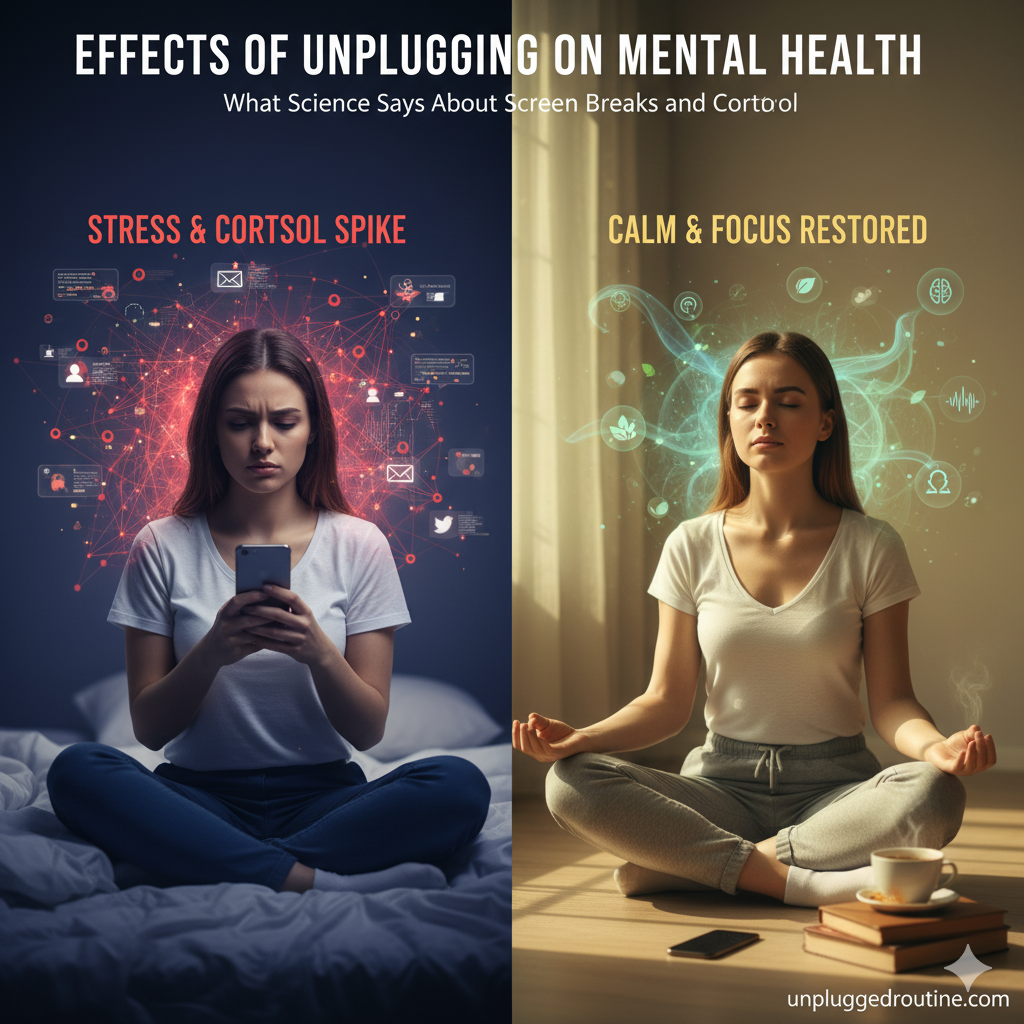Ever feel like your brain is running a thousand miles an hour, even when you’re trying to relax? Do you find yourself feeling inexplicably irritable, anxious, or just plain tired, despite getting enough sleep?
In our always-on digital world, these feelings are becoming the norm, not the exception. We’re constantly connected, bombarded by information, and expected to be reachable at all times. But what is this relentless digital engagement really doing to our minds and bodies?
The answer, according to a growing body of scientific research, might surprise you: it’s profoundly impacting your mental health. From spiking stress hormones to hijacking your focus, constant screen time comes with a hidden cost.
But here’s the good news: the solution is simpler and more powerful than you might think. It lies in the deliberate act of unplugging.
This isn’t just about feeling better; it’s about making choices backed by science to improve your well-being. Think of it as hitting the reset button on your brain’s chemistry.
Ready to understand the profound effects of unplugging on mental health and learn how intentional screen breaks can transform your well-being?
This comprehensive guide will delve into what science says about screen breaks, cortisol levels, and the powerful benefits of disconnecting. Let’s explore how mindful unplugging can lead to a calmer, happier, and more focused you!

The Digital Paradox: Connection vs. Well-being`The Digital Paradox: Connection vs. Well-being
We love our devices. They connect us, entertain us, and empower us. But this constant connectivity has a downside. Studies are increasingly showing a strong correlation between excessive screen time and a rise in mental health challenges, including:
- Increased Anxiety & Depression: Social media comparison, cyberbullying, and news overload contribute to heightened distress.
- Sleep Disturbances: Blue light from screens disrupts melatonin production, leading to insomnia and poor sleep quality.
- Reduced Attention Span: Constant notifications and multi-tasking erode our ability to focus deeply on single tasks.
- Emotional Fatigue: The pressure to maintain an online persona and respond to digital demands can be exhausting.
Understanding these links is crucial because it highlights why intentionally unplugging isn’t just a “nice-to-do,” but a vital strategy for protecting your mental health.
Cortisol, Screens, and Your Stress Response: The Science Explained
Let’s get a little scientific. One of the most significant effects of unplugging on mental health involves a key player: cortisol.
Cortisol is often called the “stress hormone.” It’s essential for our fight-or-flight response, giving us a burst of energy when facing a threat. However, in our modern world, we’re often in a state of chronic, low-level stress, and constant digital stimulation plays a big part.
Here’s the breakdown:
- The Notification Loop: Each ping, buzz, or alert triggers a mild stress response. Your brain gets a tiny hit of adrenaline and cortisol, anticipating new information or a demand.
- Constant Vigilance: Being “always on” keeps your sympathetic nervous system activated. It’s like your body is constantly bracing for a threat, even if that threat is just another email.
- Information Overload: Your brain constantly tries to process and categorize vast amounts of information from screens. This cognitive load is stressful and can elevate cortisol.
- Blue Light Impact: Beyond sleep, prolonged exposure to blue light from screens can also impact stress pathways. Some research suggests it might influence the body’s natural circadian rhythm in ways that affect cortisol regulation.
When cortisol levels remain elevated for prolonged periods, it can lead to:
- Chronic Anxiety: Your body stays in a hyper-alert state.
- Fatigue & Burnout: Your adrenal glands become overworked.
- Impaired Cognitive Function: Difficulty concentrating, memory problems.
- Physical Symptoms: Headaches, digestive issues, weakened immune system.
This direct link between digital engagement and cortisol explains a core reason why disconnecting isn’t just a trendy idea, but a physiological necessity for mental well-being.
Hook Step: Are You Experiencing “Digital Burnout”?
Before we dive into the science-backed solutions, take a moment for a quick self-assessment. Do any of these resonate with you?
- Feeling drained after scrolling through social media?
- Struggling to fall asleep after looking at your phone?
- Finding it hard to focus on a single task without checking your device?
- Experiencing a sense of panic if you can’t access your phone?
- Feeling constantly overwhelmed or irritable?
If you answered yes to even one of these, your mental health could significantly benefit from incorporating intentional unplugging.
The Science-Backed Benefits: What Happens When You Unplug?
When you intentionally step away from screens, a remarkable transformation begins in your brain and body. Here are the key effects of unplugging on mental health, supported by scientific research:
1. Reduced Stress & Lower Cortisol Levels
- The Science: Studies show that even short breaks from digital devices can lead to a decrease in perceived stress. Engaging in nature activities, for example, is directly linked to lower cortisol levels and improved heart rate variability, indicating a calmer nervous system.
- Your Experience: You’ll feel a sense of relief, a quieting of the constant mental chatter. Your body moves out of “fight or flight” and into “rest and digest.”
2. Improved Sleep Quality
- The Science: Removing blue light exposure 1-2 hours before bed allows your body to naturally produce melatonin. Research consistently links screen use before sleep to longer sleep onset, reduced REM sleep, and overall poorer sleep quality.
- Your Experience: Falling asleep becomes easier, sleep is deeper and more restorative, and you wake up feeling more refreshed and energized.
3. Enhanced Focus & Attention Span
- The Science: Constant digital interruptions train your brain to have a short attention span. Unplugging helps retrain your brain for sustained focus. Studies on “attention restoration theory” show that spending time in nature (a classic unplugging activity) can significantly improve directed attention.
- Your Experience: You’ll find yourself able to concentrate on tasks for longer, read without rereading, and engage more deeply in conversations.

4. Boosted Creativity & Problem-Solving
- The Science: Our brains need “default mode network” time – periods of mind-wandering and relaxation – to consolidate memories, process information, and spark creative insights. Constant digital input inhibits this. Unplugging allows this vital brain function to flourish.
- Your Experience: New ideas start to flow, you connect disparate thoughts, and you feel more innovative and resourceful.
5. Stronger Real-World Relationships
- The Science: “Phubbing” (snubbing someone in favor of your phone) is detrimental to relationships. Research shows that genuine face-to-face interactions, free from digital distractions, build stronger bonds, increase empathy, and contribute to a sense of belonging.
- Your Experience: Deeper conversations, more present interactions, and a richer sense of connection with friends and family.
6. Greater Self-Awareness & Emotional Regulation
- The Science: Without constant external input, you’re forced to confront your inner landscape. This quiet time fosters introspection, allowing you to better understand your emotions and reactions, and develop healthier coping mechanisms.
- Your Experience: You become more attuned to your own needs, can process emotions more effectively, and feel more grounded in who you are.
7. Reduced FOMO & Social Comparison
- The Science: Taking breaks from social media specifically has been shown to reduce feelings of envy and negative social comparison, which are significant contributors to anxiety and low self-esteem.
- Your Experience: A sense of liberation from the pressure to keep up, greater contentment with your own life, and a healthier perspective on what truly matters.
Implementing Unplugging: Science-Backed Strategies for Your Routine
Knowing the “why” is powerful, but applying the “how” is where the transformation happens. Here are simple, science-backed strategies you can use to harness the positive effects of unplugging on mental health:
Strategy 1: The “No-Phone Zone” Bedroom
- Science: Eliminates blue light before sleep and removes the temptation for late-night scrolling that disrupts circadian rhythms and elevates cortisol.
- How-To: Charge your phone in another room. Use a traditional alarm clock. Have a book or journal by your bedside instead.
Strategy 2: Tech-Free Morning Rituals
- Science: Allows your brain to wake up naturally, reducing the immediate stress response that comes with checking emails or news first thing. Promotes a calm state to start the day.
- How-To: For the first 30-60 minutes after waking, engage in activities like meditation, gentle stretching, having coffee in silence, or planning your day on paper.
Strategy 3: Scheduled Digital “Quiet Hours”
- Science: Prevents constant interruptions, which fragment attention and keep your nervous system in a state of mild alert. Creates predictable periods of focus.
- How-To: Turn off all non-essential notifications. Designate specific times of day (e.g., 9 AM-12 PM, 2 PM-4 PM) when you won’t check emails or social media.
Strategy 4: Nature Immersion Breaks
- Science: Directly reduces cortisol levels, lowers blood pressure, and activates the parasympathetic nervous system (rest and digest). Improves “directed attention.”
- How-To: Take 10-20 minute walks in a park, sit by a body of water, or simply spend time in your garden. Leave your phone behind, or put it on silent in your pocket.
Strategy 5: Embrace Analog Hobbies
- Science: Engages different neural pathways, provides tangible rewards, and fosters “flow states” which are deeply restorative and reduce anxiety.
- How-To: Pick up an old hobby or start a new one: drawing, painting, knitting, gardening, playing an instrument, cooking from scratch, or building models.
Strategy 6: The Weekly Digital Sabbath
- Science: Provides a more profound, extended reset, breaking habitual digital loops and allowing for deep rest and reconnection with real-world experiences.
- How-To: Choose one day a week to significantly minimize or completely avoid recreational screen time. Plan screen-free activities with friends or family, or enjoy solo pursuits.
Overcoming Resistance: Why Unplugging Feels Hard (and Why It’s Worth It)
You might feel a pull back to your devices, a sense of FOMO, or even restlessness when you first start unplugging. This is normal! Your brain has adapted to constant stimulation.
- Dopamine Withdrawal: Your brain might miss the quick hit of dopamine from notifications.
- Habit Loop: Reaching for your phone is often an unconscious habit.
- Fear of Missing Out: The worry that you’re missing something important.
The Solution: Recognize these feelings as part of the detox process. Remind yourself of your “why” (reduced anxiety, better focus). Replace the digital habit with a pre-planned analog activity. The initial discomfort is a small price to pay for the profound mental health benefits that await.
Your Brain Deserves a Break, Backed by Science
The evidence is clear: the effects of unplugging on mental health are overwhelmingly positive. From dramatically lowering your cortisol levels and reducing chronic anxiety to sharpening your focus, improving sleep, and sparking creativity, intentional screen breaks are a powerful tool for modern well-being.
You don’t need to live off-grid to reap these rewards. By mindfully integrating these science-backed unplugging strategies into your daily life, you can reclaim control over your digital habits and nurture a calmer, more resilient, and more present version of yourself. Your brain and body will thank you.
Ready to put science into practice and experience the profound benefits for yourself?
Which scientific benefit of unplugging resonates most with you? What’s one screen break you’re committed to trying this week? Share your thoughts and inspire others in the comments below!